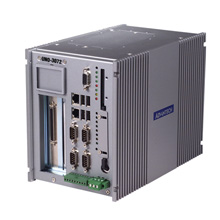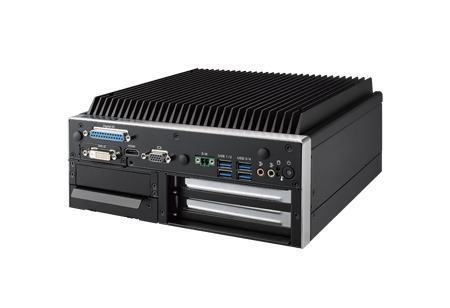The PC in the factory, a good solution?
A question is quite frequently asked: why use a PC as a PLC, rather than a real "classic" industrial PLC?
It is quite obvious that the usefulness of classical automata cannot be called into question in many cases. Micro-automatons, for example, are very simple and practical to use, for a limited cost that the PC cannot compete with. Although offering products targeted on the PC, Optimalog does not make any religion of the use of the PC as an automaton, and moreover some of the applications that we are led to carry out are done on classic automatons, which we know good.
However, the approach consisting in systematically excluding the PC from the automaton function does not seem more reasonable to us. The workshop PC is now a reality in many companies, and not just for supervision. The fully PC-controlled production machine is no longer an isolated case: many of our customers today have opted for this solution and are satisfied with it.
Indeed, for those who look closely, the PC has many advantages.
First of all, the word "PC" actually covers a wide variety of equipment. From the "standard" PC assembled by the neighborhood vendor, through the office station, to the powerful application server, the PC often has the image of a machine for home or office use. But we must not forget the whole range, vast, of industrial PCs. The latter have nothing to envy today to conventional automatons in terms of reliability and robustness. Compatible with each other, these different types of PC offer an unparalleled choice, allowing the hardware to be almost perfectly adapted to the environment and the application for which it is intended. Moreover, the multiplicity of the offer makes this market very dynamic, with rapid technical developments and for much lower costs, at equal power, than in the case of conventional automatons.
On the other hand, the use of the PC allows an opening that does not offer conventional automatons. It would never occur to any automation engineer to connect Schneider equipment to Siemens equipment: users of conventional PLCs are in fact entirely captive to the manufacturer they have chosen, and pay a high price for it. In the PC world, on the contrary, software and hardware of various origins coexist within the same application. It is possible to insert in the PC an impressive variety of electronic boards for industrial and scientific vocation concerning all the fields. In the vast majority of cases, this is done without any problem. The PC's standard communication capabilities also allow it to integrate virtually any type of peripheral (Ethernet, USB, firewire, serial link, etc.).

Next to this diversity and openness, the classic automaton does a poor job. To this, automaton manufacturers respond "no compatibility problem between equipment from the same supplier", "simplified commissioning", "training provided by the manufacturer", etc. Arguments often correct, but not always. Experience shows us that things are unfortunately not perfect either in the case of classic automatons, or in the case of the PC. But the assurance of having a single manufacturer responsible for the operation of the whole is a very reassuring point for the buyer, because it is often a substantial investment. Solutions are therefore often purchased at two, three or five times the price, for the price of a certain peace of mind. Will manufacturers be able to convince users for a long time that they ultimately save money by buying their products at a much higher price?
Another argument of automaton manufacturers: the level of training required for the implementation of an application. Admittedly, the training of an automation engineer is more targeted and shorter than that of a computer engineer. But the validity of this argument fades over the years. Automation engineers would be hard pressed today to work without using a PC, on which almost all programming workshops run. That their application also works on this same PC does not change much. On the other hand, the technical arguments concerning programming or facilities such as online modification no longer hold, various PC products intended for automation engineers, such as Optima PLC, providing exactly the same possibilities and tools as on PLCs, often better and cheaper.
In Optima PLC, the application can thus be programmed in Grafcet, in ladder diagram and with the other languages of the IEC 61131-3 standard, and not in C++ or Basic.
Finally, the argument of reliability is the ultimate weapon of manufacturers of classic automata. But that argument fizzled. First of all, as we said above, if the materials called "PC" are very diverse, it is perfectly possible today to use PCs whose seriousness and reliability have nothing to envy to classic automatons. , while remaining well below the prices of the latter.
On the other hand, if the software vulnerability of PCs has often been put forward in the past years, it is clear that the operating systems offered today are much more stable and secure. It is clear however that the total software openness of the PC is paid for by a greater vulnerability, compared to that of the automaton with which the user is very strictly supervised. But experience shows that the applications on PC carried out in the rules are neither more nor less reliable than those carried out on traditional PLC. And besides, these same automaton manufacturers are increasingly adding PCs to their catalog which often don't have much difference compared to those available elsewhere, apart from... their price.

Based on these findings, more and more companies are looking objectively at PC-based solutions for their automation problems. Decisions are then no longer taken according to positions of principle, but by really weighing the advantages and disadvantages of each solution, and the benefits they can derive from it. It is in this pragmatic approach that Optimalog wishes to register: by taking advantage of this excellent tool that is the PC when it is justified, and only in this case.
With a product like Optima PLC, Optimalog offers a solution supporting the software compatibility of equipment used on PC. And to completely reassure our customers, we also offer them PC-based solutions fully assembled according to the needs of their application, configured, tested, ready to be programmed and put into service.

